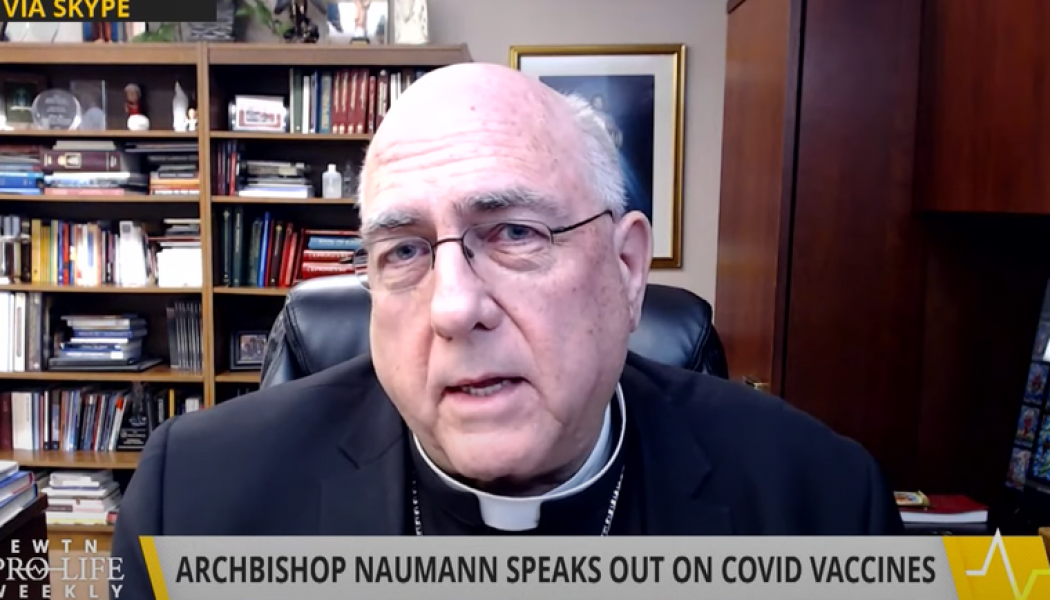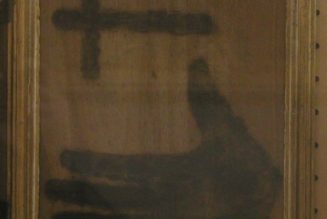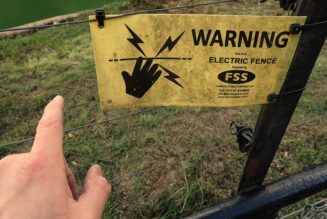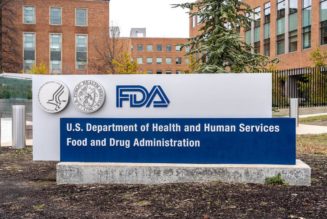
EWTN Pro-Life Weekly host Catherine Hadro spoke Monday to the chair of the U.S. Bishops Pro-Life committee, Archbishop Joseph Naumann of Kansas City, about the ethical issues surrounding the COVID-19 vaccines currently on the market. Archbishop Naumann addresses the questions and concerns many Catholics have about the abortion-tainted options. In the segment previous to Archbishop Naumann, Hadro also spoke with Dr. Stacy Trasancos who has insisted that Catholics should demand vaccines that aren’t morally compromised.
Below is a transcript of the Dec. 21 interview, edited lightly for print.
First, I want to summarize for our viewers that seven page statement both you and Bishop Kevin Rhodes released last week about the COVID vaccines. It condemns the use of aborted fetal cell lines and either the testing or the production. It discouraged Catholics from receiving the AstraZeneca vaccine because its production did involve aborted fetal cell lines, but ultimately did encourage Catholics to receive either the Pfizer or Moderna vaccines, which were tested against aborted fetal cell lines. First, would you agree with that summary of the statement released last week?
Yes, Catherine, with the one caveat, we actually did say that the AstraZeneca one could be used if there was no other available. So, again, we would – and I appreciate what Dr. Stacy said at the beginning – we wish there was available to people a vaccine that was totally, completely, completely free of any taint to abortion. And I certainly share her passion that we don’t want to in any way imply that the decision made by the researchers to use aborted fetal cell lines was a moral one or ethical one. But the question we were responding to despite that is – can it be permissible? Is it licit for a Catholic to be able to use these vaccines in the current context?
Can you speak to the original abortion involved in COVID-19 vaccine development and what is the involvement exactly?
Again, that varies with the vaccines that you’re talking about. With the Moderna and the Pfizer vaccine, there were no aborted fetal cell lines used in the production or the development. However, they did use aborted fetal cell lines in the testing to see if they were if they were effective.
The AstraZeneca one, on the other hand, does use these aborted fetal cell lines that go back to 1960 when the abortions actually occurred. So I think that’s an important point to note – that these are very old cell lines; it’s not like new abortions are happening because of these vaccines.
So there are some vaccines that are still in development; I think there are 13 or so near the final stages – and some of those are completely free of any connection with abortion. And if those become available, certainly that would be our encouragement for Catholics to use those. But if the only options are these, then we think that the Moderna and Pfizer are even more remote from their cooperation in an abortion than the AstraZeneca one.
The reason you and Bishop Rhoades gave for permitting Catholics to receive either the Pfizer or Moderna vaccine is, quote, “Thus, while neither vaccine is completely free from any connection to morally compromised cell lines, in this case the connection is very remote from the initial evil of the abortion” – a point you just reiterated. But your Excellency, isn’t a remote connection to abortion still a connection? And can you explain why the vaccines are licit then?
Yeah, you know, we actually the term is remote cooperation, which is an ethical term, so and it’s talking about what cooperation a person that’s receiving the vaccine actually is having in the abortion. And that’s why we say it’s remote, because the person receiving the vaccine really had no influence on the decision on how that vaccine was tested or developed. So in receiving the vaccine, they’re not giving approval to those decisions that were made by pharmaceutical companies basically.
To that point, is it also considered remote simply because of the amount of years between when the abortion happened and the vaccine testing? Can you clarify that?
Yes, I mean, I think it’s important to note that we don’t see this as encouraging abortion, certainly that’s not our intention and it’s not like new abortions need to occur for these cell lines. These cell lines have been replicated for decades now. And so they’re using the same cell lines, I think, more out of convenience. And again, this is where we think – and this is why the bishops of the United States really early on in the COVID epidemic, we asked our government – please make sure that there are ethical vaccines available for our people. And we said, you know, first of all, so that we can receive these, but also from a practical point of view, that people wouldn’t reject receiving these vaccines because of any connection with abortion.
And can you clarify, is this United Catholic Conference of Bishops’ teaching about remote connection and cooperation? Where does this moral theology ultimately come from?
Well actually, as you mentioned, the Vatican just put out a document and all of that whole theology on cooperation – there’s what’s called formal cooperation, where you actually are – this would be the researchers that are making the decision – they’re formally cooperating with this in a way, whereas the person receiving it is remote. And this goes way back in Catholic moral teaching, but it’s been used in several documents in the last 20 years before the COVID crisis, because there are other vaccines – like the rubella measles vaccine, the chicken pox vaccine – that’s used that also used these aborted fetal cell lines. And so the Vatican had already spoken about those and what the principles were. And again, the principle is that it’s licit, that it’s permissible. People aren’t obligated to take the vaccinations, but it’s licit and permissible. We have an obligation to do what we can to protect our own health, as well as to do what we can to protect the health of others. And those are good ethical reasons why one might choose to be vaccinated in this case.
I spoke earlier today with Dr. Stacy Trasancos. She’s executive director of the St. Philip Institute in Tyler, Texas. She has a doctorate in chemistry, Master’s in dogmatic theology, and previously worked as a chemist. She has been a vocal critic of the U.S. Bishops’ response to the COVID vaccine. Dr. Stacy Trasancos said: “We don’t want to be painted into that corner again, where we have to make this choice, this morally coerced choice, we want to fight this. We want to demand something better. It felt to me, it felt like the leadership, the Catholic leadership – bioethicists, bishops – went and ran into that corner and left us out here to fight on our own. We needed, we needed some heroism. We needed some leadership.” Archbishop Naumann, what is your response to that? What do you want to say to U.S. Catholics who share that sentiment?
Well, you know, again, I respect Dr. Stacy and I share her passion that we want to build a culture of life and end this culture of death and would like to protect every unborn child. And I would say to her, you know, again, we were early on – now the news media and others didn’t really take an interest – but early on, we were advocating – please give us vaccines that are not tainted in this way. However, when that’s the only choice for people at the current moment, the question is – is it permissible for their own health and for the health of others to take it? And the answer to that is yes.
Is it also permissible for individuals to say, I’m going to choose not to be vaccinated for this precise reason and I want to give them perhaps a more heroic witness? And the answer would be yes to that as well. But, you know, right now we have to deal with the choices that are in front of us. And, you know, I think there are people that will debate how serious is this pandemic and epidemic. I’ve heard that as well, but we’ve seen how lethal it can be for certain parts of the population. And so is it – can there be moral justification? And I think there is moral justification to use these vaccines.
Not everybody has to make that decision. And if we do use them, we are even more obligated to raise the objection to pharmaceutical companies and the government to give us ethical vaccines and not to keep resorting to these old aborted fetal cell lines.
You are a U.S. archbishop, chair of the Pro-Life Committee. As a Catholic Church leader, as a pro-life leader – what is your message then to the scientific community for ever using cells that come from a baby that was killed by abortion?
Abortion is never an ethical choice. It’s always the taking of a life of the child, and it’s never ethical to use the remains of aborted fetuses in research. And so I would say to the scientific community – don’t resort to this and we don’t need to. We have the ability to create these medical remedies without using that. And I think Moderna and Pfizer shown that they didn’t use the aborted fetal cell lines. Unfortunately, they did these confirmatory tests. But we could avoid this if our scientists would take that position that they don’t want to be tainted in their moral decision – for them, it’s a much more grave situation; those that have chosen to use this research in this way.
One question I’m seeing people raise is – how can a Catholic take up the moral obligation to protest a vaccine that was tested using aborted fetal cell lines if they are receiving the vaccine? How can you both protest it and receive it? Is that possible?
Yeah, I think it certainly is possible. You’re taking it because of health reasons, perhaps your own health, but also the public health. So it’s a life issue in that regard. And because, again, your remote in your cooperation with the abortion, this abortion happened decades ago, it’s not encouraging future abortions – but it’s important for our voice to say abortion should end. And also the use of aborted tissue in scientific research needs to end as well. So I, I think we can say both of those messages with integrity.
Do you believe Catholics are morally obligated to receive the vaccine? Are you a bad Catholic if you don’t get this vaccine?
No, you’re not morally obligated. You know, what we say in the document is that it’s permissible. And if you do choose – then the choice should be made because you’re trying actually to do an act of charity to protect the health of others. And there is a moral obligation to work for the common good. And so that’s where the, but that doesn’t mean you’re morally obligated to take the vaccine. But if you do, part of your motivation for that is for the common good.
Your statement said, quote, “There is no available alternative vaccine that has absolutely no connection to abortion.” You’ve already mentioned this already – but should Catholics, who are not immunocompromised, wait then for a completely ethical alternative, one that does not use aborted fetal cell lines in production or testing?
You know, I think, as I said, Catholics can choose to be vaccinated or they can choose not to be vaccinated, and there are other considerations. Of course, some people have concerns about other side effects to the vaccine. And we, neither the Vatican nor our document, really can address that – that’s not our expertise. But if the, if what we’re told by our government health agencies – as well as the pharmaceutical companies – that these are safe, a Catholic could choose to utilize the vaccine or choose not to. That becomes a moral choice that each of us can make and each of us can have good motivation – the motivation to protect the public health in one area. For those that choose not to, it can be to give this heroic witness, but also they need to take measures to try to protect the health of others if they make that decision as well — to do what they can with the means that are available to follow the protocols, to try to help not transmit this virus to vulnerable populations.
Are there any additional questions or concerns you’ve heard from Catholics on this topic that you want to directly address?
No, I mean, I think there are some good things that are coming out of this. I think people are becoming more aware that not only these COVID vaccines, but other vaccines, have used aborted fetal cell lines. I think this can be good. And we have seen some progress to our advocacy with some pharmaceutical companies making ethical vaccines. There’s even a rubella vaccine that is available, but it’s not been approved in the United States, it’s approved in Japan. So I think hopefully out of this will come more advocacy with our pharmaceutical companies and governments to give us vaccines that are completely free of any connection to abortion.
And finally, Archbishop Naumann, ultimately, what is your message to U.S. Catholics as they discern the ethical issues involved with the COVID-19 vaccines?
I think, like in everything, we need to pray. We need to ask the Holy Spirit to give us wisdom and to make the right choice, the moral choice for us. And we have to weigh these goods: the good of protecting our health, the health of our loved ones, the health of the community. And also at the same time, stand strongly to protect innocent human life and to bring an end to the culture of death and to abortion.
Archbishop Joseph Naumann, chair of the U.S. Bishops’ Pro-life Committee, thank you for coming on and for addressing these questions and concerns.
Thanks, Catherine, for the opportunity. God bless.
Join Our Telegram Group : Salvation & Prosperity








